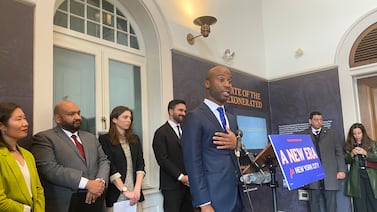Sign up for Chalkbeat’s free weekly newsletter to keep up with how education is changing across the U.S.
Can a school board member block a parent who criticizes them on Facebook?
Does it matter if the parent posts one negative comment or 100? Does it matter if the school board member just sticks to official business or if they mix posts about hiring a superintendent with posts about their kids’ birthdays?
In recent years, a number of courts have found that when public officials talk about public business on personal social media accounts, those accounts become public forums — and blocking someone from a public forum because you don’t like their speech violates the First Amendment. The most prominent case involved former President Donald Trump, who was barred from blocking critics from his @realDonaldTrump account on X, then known as Twitter.
But a recent U.S. Supreme Court decision lays out a new standard. The most important question, Associate Justice Amy Coney Barrett wrote in a unanimous opinion released Friday, is not whether a public official is discussing public business. It’s whether the public official is posting on social media in their official capacity. The key question is: Are they authorized to speak on behalf of the government and are they exercising that authority in their posts?
If they aren’t operating in their official capacity, then their posts about public business are like those of any private citizen posting about their job. Their personal social media accounts aren’t public forums — and they can block and ban who they like without violating anyone else’s First Amendment rights.
The decision seems to give more leeway to school board members and other officials who want to block critics on social media. It comes at a time when school board officials sometimes face personal attacks and harassment from members of the public they represent, and as laws and norms have struggled to keep up with the ways technology is transforming the public sphere.
But the justices also cautioned that each case requires careful consideration of the facts. Public officials who are acting in their official capacity in their social media posts can still be sued for blocking people, even if those official posts appear on a personal page next to family photos and cat videos.
“We think the rule is as plainly stated as we could have asked for, but that doesn’t mean it will be clearly applied,” said Sonja Trainor, managing director for school law and legal programming for the National School Boards Association. “It leaves open many questions that will have to be resolved by the lower courts one fact scenario at a time.”
Cases deal with public officials and personal accounts
The scenarios that drove the Supreme Court ruling are common ones.
In Port Huron, Michigan, Kevin Lindke was upset about how his city was handling COVID. He posted many comments on the public Facebook page of City Manager James Freed. Freed used his page, where he identified himself as the city manager, to post a mix of personal and professional information. Freed first deleted Lindke’s comments, then blocked him.
Lindke sued, arguing that Freed’s page constituted a public forum. But the U.S. District Court and then the 6th U.S. Circuit Court of Appeals sided with Freed because posting on Facebook was not part of his official job duties.
In Poway Unified School District in San Diego, parents Christopher and Kimberly Garnier were unhappy with their school board. They posted numerous comments about racial disparities in the district and allegations of financial misconduct by the superintendent on the Facebook pages of school trustees Michelle O’Connor-Ratcliff and T.J. Zane, as well as on O’Connor-Ratcliff’s Twitter posts.
Like Freed, the school trustees first deleted these comments, then blocked the Garniers, who sued. Unlike Freed, the trustees described themselves as government officials in their public Facebook pages and posted exclusively about school business — encouraging people to attend school board meetings or offer feedback on proposals.
The 9th U.S. Circuit Court of Appeals sided with the Garniers. They looked at the appearance and function of the social media accounts and concluded they functioned like “an organ of official business.”
Because the two appeals courts reached different conclusions using different reasoning, the Supreme Court took up the case and heard arguments in the fall. The decision uses the facts of the Lindke case to develop the new standard and asks the appeals courts to apply it to their decisions in Lindke and in Garnier.
Questions about whether pages appear official or personal might still be relevant, Barrett wrote, but only if the person doing the posting is operating in his official capacity. “If the public employee does not use his speech in furtherance of his official responsibilities, he is speaking in his own voice,” Barrett wrote.
What it means for school board members and the public
Katie Fallow, who represented the plaintiffs in the Trump Twitter lawsuit as senior counsel at the Knight First Amendment Institute at Columbia University, said the new standard is much murkier and “doesn’t take into account how government officials use their personal accounts.”
Many officials want to use one account for everything because that account represents their brand or they have a lot of followers. These accounts are “essentially public forums where members of the public go to find out information about their government and discuss and criticize and praise policy,” Fallow said. “It’s important that the government not be able to block people from participating based on viewpoint.”
Colorado last year gave public officials sweeping ability to ban people from personal accounts. These are defined as any account not supported by public resources or that the official is not required to operate. That’s a much broader definition of personal account, said Cat Ordóñez, policy counsel for the American Civil Liberties Union of Colorado, and officials following state law could still violate someone’s First Amendment rights.
A Denver parent sued a school board member who blocked her last year but recently settled the case, putting an end to that challenge.
It remains unclear how the new standard would apply to Colorado’s law, which is the first of its kind in the nation — or even to the Poway trustees.
Fallow and Trainor both said school board members should strongly consider keeping conversations about school business on official accounts and keeping their personal accounts personal. That advice hasn’t changed.
But when it comes to mixed-use accounts, the court ruling draws new lines. Accounts that are labeled personal or contain disclaimers such as “the views expressed are strictly my own” are probably personal, the court found.
That means officials can more freely block and ban users, and community members face a higher bar to prove their rights were violated.
But officials can’t just label an account personal, use it for official business, then ban critics, Barrett wrote.
And the blunter the blocking tool, the more likely that a public official might violate someone’s rights, Barrett wrote. She noted, for example, that users blocked on X can’t see any posts from that account.
Trainor said school board members should talk to their lawyers about setting clear policies. Denver is in the process of doing this. Officials can disable comments entirely so they don’t have to worry about moderation, or they can set rules that apply equally to everyone.
Still, Trainor said these distinctions between the personal and official aren’t intuitive in offline life.
A school board member who ran into someone at the grocery store “wouldn’t think twice about talking about the price of milk and the new math curriculum in the same conversation,” she said. “It’s part of the give and take. And now online there is some new guidance, and you have to try to keep those two worlds separate.”
Erica Meltzer is Chalkbeat’s national editor based in Colorado. Contact Erica at emeltzer@chalkbeat.org.






